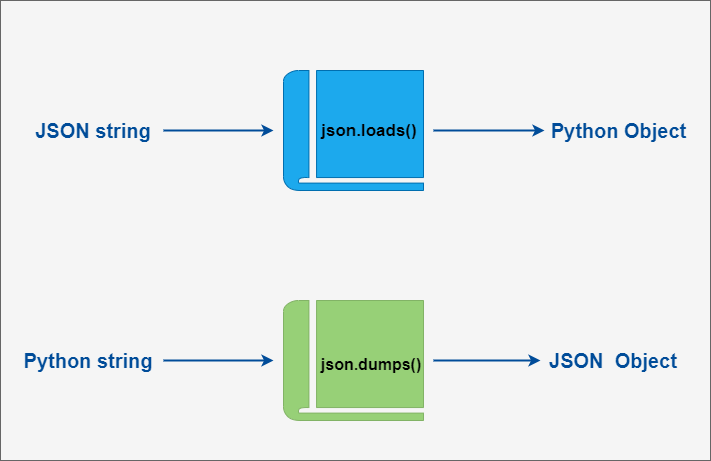- Python3 JSON 数据解析
JSON (JavaScript Object Notation) 是一种轻量级的数据交换格式。
Python3 中可以使用 json 模块来对 JSON 数据进行编解码,它包含了两个函数:
json.dumps(): 对数据进行编码。
json.loads(): 对数据进行解码。

在 json 的编解码过程中,Python 的原始类型与 json 类型会相互转换,具体的转化对照如下:
Python 编码为 JSON 类型转换对应表:
Python JSON
dict object
list, tuple array
str string
int, float, int- & float-derived Enums number
True true
False false
None null
JSON 解码为 Python 类型转换对应表:
JSON Python
object dict
array list
string str
number (int) int
number (real) float
true True
false False
null None
json.dumps 与 json.loads 实例
以下实例演示了 Python 数据结构转换为JSON:
实例(Python 3.0+)
1
2
3
4
5
6
7
8
9
10
11
12
13
14
#!/usr/bin/python3
import json
# Python 字典类型转换为 JSON 对象
data = {
'no' : 1,
'name' : 'Runoob',
'url' : 'http://www.runoob.com'
}
json_str = json.dumps(data)
print ("Python 原始数据:", repr(data))
print ("JSON 对象:", json_str)
执行以上代码输出结果为:
Python 原始数据: {'url': 'http://www.runoob.com', 'no': 1, 'name': 'Runoob'}
JSON 对象: {"url": "http://www.runoob.com", "no": 1, "name": "Runoob"}
通过输出的结果可以看出,简单类型通过编码后跟其原始的repr()输出结果非常相似。
接着以上实例,我们可以将一个JSON编码的字符串转换回一个Python数据结构:
实例(Python 3.0+)
1
2
3
4
5
6
7
8
9
10
11
12
13
14
15
16
17
18
19
#!/usr/bin/python3
import json
# Python 字典类型转换为 JSON 对象
data1 = {
'no' : 1,
'name' : 'Runoob',
'url' : 'http://www.runoob.com'
}
json_str = json.dumps(data1)
print ("Python 原始数据:", repr(data1))
print ("JSON 对象:", json_str)
# 将 JSON 对象转换为 Python 字典
data2 = json.loads(json_str)
print ("data2['name']: ", data2['name'])
print ("data2['url']: ", data2['url'])
执行以上代码输出结果为:
Python 原始数据: {'name': 'Runoob', 'no': 1, 'url': 'http://www.runoob.com'}
JSON 对象: {"name": "Runoob", "no": 1, "url": "http://www.runoob.com"}
data2['name']: Runoob
data2['url']: http://www.runoob.com
如果你要处理的是文件而不是字符串,你可以使用 json.dump() 和 json.load() 来编码和解码JSON数据。例如:
实例(Python 3.0+)
1
2
3
4
5
6
7
# 写入 JSON 数据
with open('data.json', 'w') as f:
json.dump(data, f)
# 读取数据
with open('data.json', 'r') as f:
data = json.load(f)